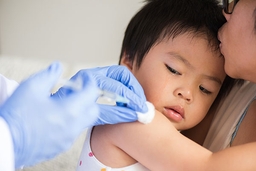Why You Should Get Vaccinated Before Marrying

Physical wellness is just as vital as mental and financial readiness for the bride and groom. You may be sick of hearing this, but marriage is not a one-night stand. It is a fresh start that must be prepared for. Preventing disease in married life with premarital immunization is a wise decision.
Screening is the first step to preparing for physical health before marriage. The purpose is to learn about each prospective bride and groom's health.

Is there a chance that certain diseases will be passed on to my spouse? Is a congenital illness present? Is there a risk of disease transmission to our prospective baby?
A health screening will provide answers to all of those queries.
Naturally, we expect "clean" screening results—both the bride and groom are in good health. However, simply being "clean" does not guarantee long-term health because the couple will have sex on a regular basis following their marriage. So immunization is necessary.
The vaccine will not only keep the couple healthy, but it will also protect their unborn baby.
Vaccines are the most efficient way to protect ourselves against a wide range of diseases. It works by stimulating the immune system to fight the disease. Vaccines can also prevent disease from developing in the body and lessen the severity of symptoms that do arise.
Premarital vaccinations should be administered at least 7 months before the wedding day. Vaccinations must also be administered by both the bride and groom, not just one. But what are the premarital vaccines?
Premarital vaccine types

1. HPV-4 or HPV-9
Human Papillomavirus (HPV) causes significant diseases of the reproductive organs in both men and women. This virus spreads through both sexual (penetration) and non-sexual contact (oral, sex toys, etc.). There are several varieties of HPV that cause various diseases.
Cervical cancer, the second-leading cause of death in women of reproductive age, can be caused by HPV types 16 and 18. The HPV vaccine is given three times within a period of six months. The second dose is given 1-2 months after the first dose, and the third dose is given 6 months after the first dose.
HPV infection in men can result in penile cancer. Discoloration, skin thickening, or tissue buildup on the penis are the symptoms. Infection can also result in open sores and the growth of lumps (genital warts).
2. Hepatitis B
Hepatitis B is an inflammation of the liver that can lead to cirrhosis or liver cancer. The cause is infection with the Hepatitis B virus, which is spread through bodily fluids, sexual contact, and transplacental (from mother to fetus). The problem is that it does not cause symptoms in the early stages.
Vaccines can help prevent Hepatitis B. Adults who are getting married and have risk factors, such as being currently undergoing treatment for sexually transmitted diseases, having a partner infected with hepatitis B, being health workers who frequently have direct contact with patient body fluids, and frequently traveling to areas or countries with hepatitis B endemic status, must receive another vaccine.
3. MMR
The MMR vaccine protects against measles, mumps, and rubella. Measles during pregnancy raises the risk of fetal development problems, early birth, and miscarriage. Rubella during pregnancy causes CRS (Congenital Rubella Syndrome), which raises the risk of birth abnormalities. For example, suffering from cataracts or congenital deafness.
Because the MMR vaccine is a live vaccine, it should not be given during pregnancy. The MMR vaccine is administered twice during a 28-day (4 weeks) period. As a result, vaccines must be completed at least 4 weeks before planning to become pregnant. It is legal if you obtain the MMR immunization after marriage. However, you should postpone your pregnancy plans until the immunization is complete.
4. TT and DPT
The bride-to-be must first obtain the tetanus and toxoid vaccine (TT), as required by the Indonesian government. This is due to the fact that tetanus infections can occur during childbirth, specifically when the umbilical cord is cut. Diphtheria and pertussis infections are also major causes of morbidity and mortality in newborns under the age of two months.
You do not need to get the TT vaccine if you have previously had the DPT vaccine because the TT vaccination is already included in the DPT. Repetition or boosters every 10 years are possible. This vaccine is also safe for women who are planning to become pregnant or who are already pregnant.
5. Varicella zoster vaccination
Varicella zoster is the virus that causes herpes and chickenpox. If you have this disease while pregnant, your chances of having a defective fetus increase. It cannot be given during pregnancy because it is a live vaccine. The safest time is before getting married or planning a pregnancy.
This vaccine is also recommended for couples under the age of 30 who have never experienced chickenpox. Don't be concerned if you're unsure whether you've received the smallpox vaccine. You can get the vaccine again if your doctor recommends it.
In addition to the 5 vaccines above, it is also important to repeat the influenza vaccination. This vaccine actually needs to be repeated every year. Before starting a new life and planning a pregnancy, make sure to strengthen your immune system again.
Vaccines are the most effective preventive measure. Don't take it for granted! Build your new life with your beloved one smarter, healthier, happier.
If you have questions regarding premarital vaccinations, click on WhatsApp.



